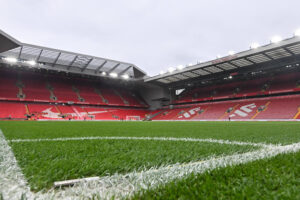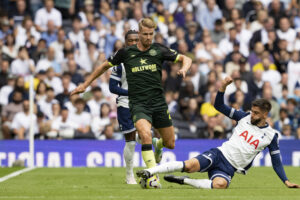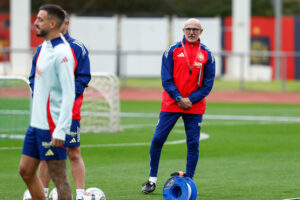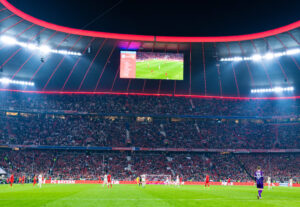When your opponent gifts you an assist, as was the case when Fred trod on David De Gea’s ankle and Emile Smith Rowe scored while the Spanish goalkeeper was still writhing around on his goal-line, and you still lose the match, you know you have a problem winning big games away from home. And so it was for Arsenal against Manchester United, when they continued their generally wretched away run against fellow members of the supposed ‘Big Six’ in the Premier League (although Manchester City, Chelsea and Liverpool surely now constitute a new ‘Big Three’) by losing 3-2 despite taking an early lead, albeit in bizarre circumstances.
For Mikel Arteta and his team, and indeed for all Arsenal fans, the overriding sense after the game must have been sheer unadulterated frustration. If ever a Manchester United side playing at home was there for the taking, it was surely this one, especially after Arsenal scored the opening goal. If the Gunners had held on to that lead, they would have climbed into the top four of the Premier League ahead of a relatively benign run of games before Christmas and demonstrated that they were genuine contenders for the fourth Champions League place. Instead, their own deficiencies in tactics and personnel, combined with the enduring genius of Cristiano Ronaldo, meant that they left Manchester with nothing and seemingly confirmed all the nagging doubts about them.
Midfield is Still the Biggest Problem for Arsenal
Arsenal’s One Genuine Cause for Grievance
Arsenal had one genuine cause for grievance at Old Trafford. Martin Ødegaard, having scored a brilliant equaliser to make the game 2-2, undoubtedly brought Fred down in the box to give Manchester United their game-winning penalty. And yet if that penalty was rightly given by the VAR after referee Martin Atkinson had failed to award it initially, why on earth didn’t VAR award Arsenal an almost equally blatant penalty at the end of the first half, when Harry Maguire clearly pulled down Takehiro Tomiyasu in the Manchester United box when they were challenging for an Arsenal free-kick? Either both penalties should have been awarded, or neither. The fact that only one was given just strengthens the conviction that the next development in the use of VAR will be to allow managers at least one VAR challenge per half, in accordance with the use of video replays in almost every other professional sport, from American football to tennis.
But All Their Other Problems Were of Their Own Making
Nevertheless, to concentrate on that glaring mistake by the VAR would be to overlook all the other problems that Arsenal created for themselves. As Thierry Henry, in his analysis for Amazon Prime, correctly identified at half-time, the Gunners began brightly, up to the point where they took the lead, but then fell backwards and dropped too deep in defence. Indeed, they did so to the extent that a Manchester United equaliser felt inevitable long before Fred atoned for his earlier error by setting up Bruno Fernandes for a relatively straightforward leveller.
Nor were all the Arsenal mistakes tactical, because there are clearly problems with selection too, notably up front. Unfortunately, Pierre-Emerick Aubameyang seemed to confirm the downward trajectory of his Arsenal career since signing his new contract by missing a succession of relatively easy chances. And Bukayo Saka, when he came on as a second-half substitute, only added to the impression that he is yet another England player nursing a considerable Euro 2020 hangover by failing to capitalise on the two occasions when he was left unmarked in the box but failed to muster a meaningful effort on goal.
The Big Problem is Midfield
However, these tactical and personnel problems are fixable, even in the short term. Tactically, Arsenal must now begin to appreciate that they finally have a defence worthy of the name, such that they can continue to push on against an opponent even after they have taken the lead. And if Aubameyang’s best days at Arsenal are indeed over, the Gunners appear to have a ready-made replacement in the brilliant young Brazilian Gabriel Martinelli, who generally excelled against Manchester United, even on the wing, and will surely be even better when he is finally given a prolonged run in the centre of Arsenal’s attack.
Unfortunately, the biggest problem for Arsenal and Arteta is not so easily fixable. That is the continuing absence of a genuinely creative, passing midfielder, one who can link together the improving defence and the still-potent attack, and above all add goals and assists to the team. Arsenal, having been spoiled throughout most of Arsène Wenger’s tenure by having a steady stream of such midfielders from Emmanuel Petit to Edu to Cesc Fabregas, have not really had one since Santi Cazorla suffered the first of the series of injuries, in the autumn of 2015, that ultimately led to his departure from Arsenal.
Of course, pre-eminent among those Wenger-era midfield generals was the great Patrick Vieira, who is now the Crystal Palace manager. In the build-up to last weekend’s game between Vieira’s Palace and an Aston Villa side now led by another great midfield player, Steven Gerrard, Vieira paid Gerrard the ultimate compliment by saying that he was “a holding midfielder who could also play as a number ten”. The same was true of Vieira himself and even Roy Keane, the third of the triumvirate of truly great Premier League-era midfielders. Unfortunately, it is emphatically not true of Thomas Partey.
Partey is a Holding Midfielder, Not a Number Ten
Thomas Partey was signed by Mikel Arteta in the summer of 2020 as essentially a holding or defensive midfielder, the position that he had starred in at Atletico Madrid. Since then, Partey has been afflicted by a number of injuries that have prevented him from consolidating his place in the Arsenal team. But it is also arguable that Arteta has consistently failed to get the best out of him, either by not providing him with a proper midfield partner or by playing him out of position.
At the end of last season and the beginning of this one, Arteta occasionally dabbled with playing Emile Smith Rowe or Martin Ødegaard alongside Partey in central midfield, notably against Villareal in the second leg of the Europa League semi-final. However, given that both players are undoubtedly number tens or attacking midfielders, the net result was that Arsenal effectively played with a one-man central midfield, which was easily overrun by skilful opposition such as Villareal.
Having belatedly realised that a one-man central midfield simply will not cut it in top-flight football, either domestically or in European competition, Arteta has made another mistake in pairing Partey with another, almost identical defensive or holding midfielder, such as Granit Xhaka (who is now out through injury), Albert Sambi Lokonga or, worst of all, Mohamed Elneny, as was the case against Manchester United. In playing other, inferior defensive midfielders alongside Partey, Arteta, deliberately or otherwise, is putting the onus on Partey to be more advanced and attacking in his game, which is absolutely not playing to his strengths.
A General Lack of Midfield Generals
Of course, Arteta is far from alone in wanting a midfield general to guide and direct his team’s play. Arguably, the absence of such players is an endemic problem in modern football, as demonstrated by the sheer mediocrity of Manchester United’s own midfield pairing of Fred and Scott McTominay. In the club game, at least in England, that is possibly because Pep Guardiola, a great midfield orchestrator himself, has almost stockpiled all the skilful midfield operators available in creating virtually a whole team of number tens, with Kevin De Bruyne, Bernardo Silva, İlkay Gündoğan, Riyad Mahrez and now Jack Grealish all exemplifying the kind of skilful, goal-scoring and goal-creating midfielder that other teams, including Arsenal, are crying out for.
Unlike Gareth Southgate, who can only select English players at international level and so has become stuck with another overly defensive midfield pairing in Declan Rice and Kalvin Phillips, whose lack of invention was arguably the single biggest reason that England didn’t win Euro 2020, Mikel Arteta can at least look worldwide for the ideal midfield partner for Partey, one whose skill and passing ability can complement the Ghanaian’s more obvious physical attributes. But he will need to find one soon if Arsenal are to capitalise on an opportunity that was unforeseen at the start of the season and somehow get back into the Champions League.
Main Photo






